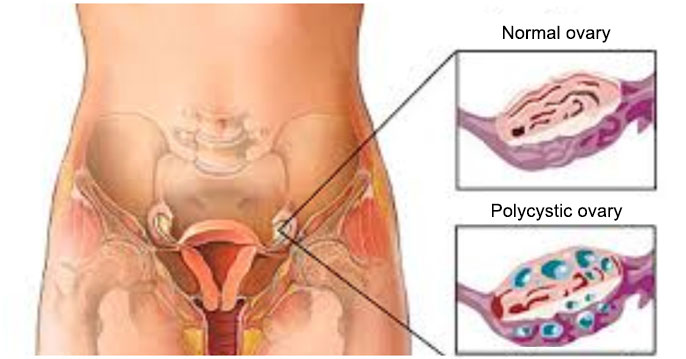Polycystic Ovary Disease (PCOD)
What is PCOD?
PCOD, or Polycystic Ovary Disease, is a kind of hormonal disorder that affects one in 10 women. It refers to a condition when a woman has a number of small cysts in the ovaries. Besides unpredictable hormonal behavior, this condition can trigger diabetes, infertility, acne and excessive hair growth.
What causes PCOD?
Doctors don’t know exactly what causes PCOS. They believe that high levels of male hormones prevent the ovaries from producing hormones and making eggs normally.
Genes, insulin resistance, and inflammation have all been linked to excess androgen production.

What are the common symptoms of PCOS?
Some women start seeing symptoms around the time of their first period. Others only discover they have PCOS after they’ve gained a lot of weight or they’ve had trouble getting pregnant.
The most common PCOS symptoms are:
1. Irregular periods
2. Heavy bleeding
3. Hair growth
4. Acne
5. Weight gain
6. Male-pattern baldness
7. Darkening of the skin
8. Headaches
How PCOS affects your body?
Having higher-than-normal androgen levels can affect your body and other aspects of your health.
 Infertility
Infertility High Blood Sugar
High Blood Sugar High Blood Pressure
High Blood Pressure High Cholesterol level
High Cholesterol level Sleep apnea
Sleep apnea Endometrial cancer
Endometrial cancer Depression
Depression
How PCOS is diagnosed?
For a proper diagnosis, you’ll need to see a gynecologist to get a pelvic exam. PCOS in women who have at least two of these three symptoms:
 high androgen levels
high androgen levels irregular menstrual cycles
irregular menstrual cycles cysts in the ovaries
cysts in the ovaries
Your doctor should also ask whether you’ve had symptoms like acne, face and body hair growth, and weight gain.
How are PCOS treated?
It is a life style management and some medication. Your doctor will develop a treatment plan based on your symptoms and your overall health. You may receive a combination of treatments.



